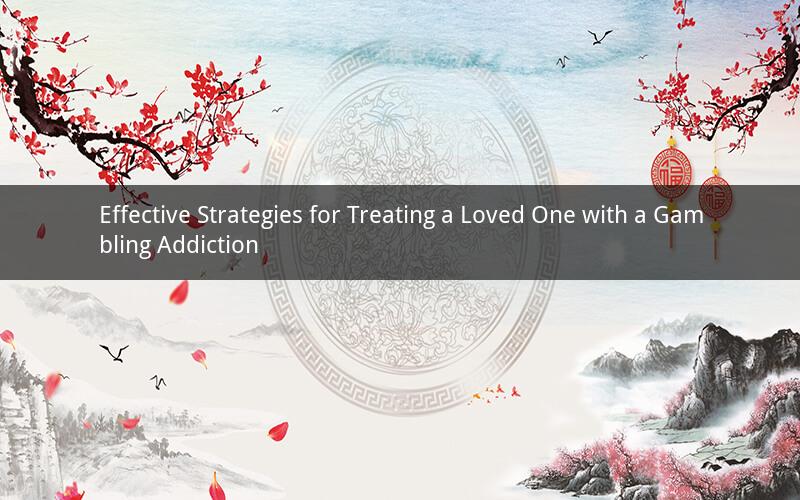
Treating someone with a gambling addiction is a complex and challenging process that requires patience, understanding, and dedication. It is crucial to approach the situation with empathy and a willingness to support the individual in their journey towards recovery. This article aims to provide insights into how to treat someone with a gambling addiction, offering practical strategies and tips for both individuals and their loved ones.
Understanding the Problem
The first step in treating a gambling addiction is to acknowledge the problem. Gambling addiction is a behavioral disorder characterized by an inability to control the urge to gamble, despite negative consequences. It is important to recognize the signs and symptoms of gambling addiction, such as financial difficulties, strained relationships, and a preoccupation with gambling.
Creating a Supportive Environment
Once the addiction is acknowledged, creating a supportive environment is essential. Encourage open communication and be patient as the individual works through their feelings and emotions. Here are some ways to create a supportive environment:
1. Listen actively: Be attentive and non-judgmental when the person shares their thoughts and feelings about gambling. This can help them feel understood and supported.
2. Offer empathy: Understand that the individual may feel ashamed or guilty about their addiction. Showing empathy can help alleviate these feelings.
3. Avoid enabling: It is important not to enable the individual's gambling behavior by providing money or covering up for their mistakes. This can hinder their recovery process.
4. Encourage professional help: Suggest that the individual seek professional treatment, such as therapy or counseling, to address the underlying issues contributing to their addiction.
Developing Coping Skills
Teaching the individual healthy coping skills is crucial for their recovery. These skills can help them manage stress, anxiety, and other triggers that may lead to relapse. Here are some coping skills to consider:
1. Mindfulness and meditation: These practices can help individuals stay grounded and present, reducing the urge to gamble.
2. Physical exercise: Regular physical activity can improve mood and reduce stress levels.
3. Social support: Encourage the individual to engage in activities with friends and family members who do not gamble. This can help them build a supportive social network.
4. Creative outlets: Encourage the individual to explore hobbies and interests that do not involve gambling, such as painting, writing, or playing a musical instrument.
Identifying Triggers
Identifying triggers is essential for preventing relapse. Triggers are situations, emotions, or places that may cause the individual to gamble. Some common triggers include:
1. Emotional distress: Stress, anxiety, and sadness can increase the urge to gamble.
2. Social situations: Encounters with other gamblers or visits to casinos may trigger gambling behavior.
3. Financial strain: Concerns about debt or financial problems can lead to a desire to gamble as a solution.
To help the individual avoid triggers, it is important to:
1. Develop a trigger plan: Work with the individual to create a plan for how to handle triggers when they arise.
2. Stay connected: Keep in touch with the individual and offer support when they encounter triggers.
3. Create a safe space: Encourage the individual to establish a safe and trigger-free environment where they can relax and decompress.
Monitoring Progress
Monitoring the individual's progress is essential to ensure that their recovery is on track. Here are some ways to monitor progress:
1. Set goals: Work with the individual to set realistic and achievable goals for their recovery.
2. Track progress: Keep a journal or log to document the individual's progress and setbacks.
3. Offer praise and encouragement: Recognize and celebrate the individual's achievements, no matter how small.
4. Seek feedback: Encourage the individual to provide feedback on their recovery process and any challenges they may be facing.
Frequently Asked Questions
Q: Can someone overcome a gambling addiction on their own?
A: While some individuals may recover without professional help, it is often beneficial to seek support from therapists, counselors, or support groups. These resources can provide additional guidance, support, and coping strategies.
Q: Will the individual ever be able to gamble again?
A: The goal of treatment is to help the individual manage their gambling addiction and develop healthy coping skills. Whether or not they can gamble again depends on their progress and ability to resist triggers.
Q: Can a gambling addiction be cured?
A: A gambling addiction is considered a chronic condition, similar to other addictive disorders. While there is no cure, recovery is possible with proper treatment and support.
Q: How can I help a loved one who is struggling with a gambling addiction?
A: Be patient, understanding, and supportive. Encourage your loved one to seek professional help, offer to attend therapy sessions with them, and create a safe and supportive environment.
Q: What if my loved one refuses to seek help?
A: It can be difficult to convince someone to seek help, especially if they are in denial. However, you can continue to offer support and show empathy. In some cases, it may be necessary to seek professional advice on how to handle the situation.
In conclusion, treating someone with a gambling addiction requires patience, understanding, and a willingness to support the individual in their recovery journey. By creating a supportive environment, developing coping skills, identifying triggers, and monitoring progress, you can help your loved one overcome their addiction and rebuild their life.